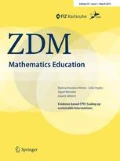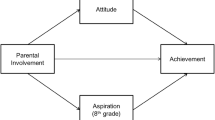Abstract
Even in primary school, mathematics achievement depends upon the efficiency of cognitive, metacognitive and self-regulatory processes. Thus, for pupils to carry out a computation, such as a written calculation, metacognitive mechanisms play a crucial role, since children must employ self-regulation to assess the precision of their own thinking and performance. This assessment, in turn, can be helpful in the regulation of their own learning. In this regard, a body of literature suggests that the application of psychoeducational interventions that promote the development of mathematics-related metacognitive (e.g., control) processes, based on the analysis of the students’ errors, can successfully influence mathematics performance. The main objective of the current study was to investigate the impact of a metacognitive and cognitive training program developed to enhance various arithmetic skills (e.g., syntax, mental and written calculation), self-regulatory and control functions in primary and secondary school students exhibiting atypical mathematical development. Sixty-eight Italian children, 36 male and 32 female (mean age at pretest = 9.3 years, SD = 1.02 years), meeting the criteria for the diagnosis of dyscalculia or specific difficulties in mathematics, took part in the study. Of these, 34 children (i.e., experimental group) underwent the cognitive and self-regulatory intervention enhancing mathematics skills training for 16 weekly sessions. The remaining students were assigned to the control group. For a pre-test and post-test, a battery of standardized mathematical tests assessing different mathematics skills, such as written and mental operations, digit transcription and number ordering skills, was administered and provided a series of measures of calculation time and accuracy (i.e., number of errors). In the post-test, the experimental group exhibited better accuracy in written calculation and in digit transcription. Overall, the current outcomes demonstrate that psychoeducational interventions enriching metacognitive and mathematical achievements through error analysis may be an effective way to promote both the development of self-regulatory and control skills and mathematical achievement in children with atypical mathematical development.
Similar content being viewed by others
References
Ashcraft, M. A. (2016) Math anxiety: personal, educational, and cognitive consequences. Current Directions in Psychological Science 11(5):181–185
Baten, E., Praet, M., & Desoete, A. (2017). The relevance and efficacy of metacognition for instructional design in the domain of mathematics. ZDM Mathematics Education, 49, 613–623. https://doi.org/10.1007/s11858-017-0851-y.
Belacchi, C., Scalisi, T. G., Cannoni, E., & Cornoldi, C. (2008). Manuale CPM. Coloured progressive matrices. Standardizzazione Italiana [CPM manual. Coloured progressive matrices. Italian validation]. Firenze: Giunti O.S. Organizzazioni Speciali.
Borkowski, J. G., & Muthukrishna, N. (1994). Lo sviluppo della metacognizione nel bambino: un modello utile per introdurre l’insegnamento metacognitivo in classe. Insegnare all’Handicappato, 8, 229–251.
Cargnelutti, E., Tomasetto, C., & Passolunghi, M. C. (2016). How is anxiety related to math performance in young students? A longitudinal study of Grade 2 to Grade 3 children. Cognition and Emotion, 31, 755–764. https://doi.org/10.1080/02699931.2016.1147421.
Caviola, S., Mammarella, I., Cornoldi, C., & Lucangeli, D. (2009). A metacognitive visuospatial working memory training for children. International Electronic Journal of Elementary Education, 2(1), 122–136.
Cornoldi, C. (Ed.). (2007). Difficoltà e disturbi dell’apprendimento [Learning difficulties and disabilities]. Bologna: Il Mulino.
Cornoldi, C., Caponi, B., Focchiatti, R., Lucangeli, D., Todeschini, M., & Falco, G. (1995). Matematica e metacognizione [Mathematics and metacognition]. Trento: Edizioni Erickson.
Cornoldi, C., Carretti, B., Drusi, S., & Tencati, C. (2015). Improving problem-solving in primary school students: the effect of a training program focusing on metacognition and working memory. British Journal of Educational Psychology, 85, 424–439. https://doi.org/10.1111/bjep.12083.
Cornoldi, C., & Cazzola, C. (2004). AC-MT 11–14. Test di valutazione delle abilità di calcolo e problem solving dagli 11 ai 14 anni Gruppo MT [AC-MT 11–14. Test for the assessment of calculation and problem solving skills from 11 to 14 years of age MT Group]. Trento: Edizioni Erickson.
Cornoldi, C., Lucangeli, D., & Bellina, M. (2012). AC-MT 6–11. Test di valutazione delle abilità di calcolo e soluzione dei problemi Gruppo MT [AC-MT 6–11. Test for the assessment of calculation and problem solving skills from 6 to 11 years of age Gruppo MT]. Trento: Edizioni Erickson.
Dennis, M. S., Sharp, E., Chovanes, J., Thomas, A., Burns, R. M., Custer, B., & Park, J. (2016). A meta-analysis of empirical research on teaching students with mathematics learning difficulties. Learning Disabilities Researche and Practice. https://doi.org/10.1111/ldrp.12107.
Desoete, A., Roeyers, H., & De Clercq, A. (2003). Can off-line metacognition enhance mathematical problem solving? Journal of Educational Psychology, 95, 188–200. https://doi.org/10.1037/0022-0663.95.1.188.
Dinsmore, D. L., Alexander, P. A., & Loughlin, S. M. (2008). Focusing the conceptual lens on metacognition, self-regulation, and self-regulated learning. Educational Psychology Review, 20(4), 469–475.
Duncan, G. J., Dowsett, C. J., Claessens, A., Magnuson, K., Huston, A. C., Klebanov, P., et al. (2007). School readiness and later achievement. Developmental Psychology, 43, 1428–1446. https://doi.org/10.1037/0012-1649.43.6.1428.
Fastame, M. C., & Callai, D. (2015). Empowering visuo-spatial ability in primary school: Results from a follow-up study. Educational Psychology in Practice, 31, 86–98. https://doi.org/10.1080/02667363.2014.989315.
Flavell, J. H. (1979). Meta-cognitive and cognitive monitoring: A new area of cognitive developmental inquiry. American Psychologist, 31, 906–911.
Garofalo, J., & Lester, F. K. (1985). Metacognition, cognitive monitoring, and mathematical performance. Journal of Research in Mathematics Education, 16, 163–176.
Geary, D. C., Hoard, M. K., & Bailey, D. H. (2012). Fact retrieval deficits in low achieving children and children with mathematical learning disability. Journal of Learning Disabilities, 45, 291–307. https://doi.org/10.1177/0022219410392046.
Hultsch, D. F., Herzog, C., Dixon, R. A., & Davidson, H. (1988). Memory self-knowledge and self-efficacy in the aged. In M. L. Howe e C. J. Brainerd (Eds.), Cognitive development in adulthood: Progress in developmental research (pp. 65–92). New York: Springer.
Jitendra, A. K., Lein, A. E., Im, S. H., Alghamdi, A. A., Hefte, S. B., & Mouanoutoua, J. (2018). Mathematical interventions for secondary students with learning disabilities and mathematics difficulties: A meta-analysis. Exceptional Children, 84(2), 177–196. https://doi.org/10.1177/0014402917737467.
Lucangeli, D., Cornoldi, C., & Tessari, F. (1991). Bambini con disturbi di apprendimento in lettura e matematica: Aspetti comuni e specificità nei deficit cognitivi e di conoscenza metacognitiva. Psichiatria dell’Infanzia e dell’Adolescenza, 58(5–6), 629–664.
Lucangeli, D., & Mammarella, I. (2010). Psicologia della cognizione numerica: Approcci teorici, valutazione e intervento [Numerical knowledge psychology: Theory, assessment and intervention]. Milan: Franco Angeli.
Mevarech, Z., & Fridkin, S. (2006). The effects of IMPROVE on mathematical knowledge, mathematical reasoning and meta-cognition. Metacognition Learning. https://doi.org/10.1007/s11409-006-6584-x.
Mevarech, Z. R., & Kramarski, B. (1997). IMPROVE: A multidimensional method for teaching mathematics in heterogeneous classrooms. American Educational Research Journal, 34, 365–395. https://doi.org/10.3102/00028312034002365.
National Council of Teachers of Mathematics (NCTM) (2000). Principles and standards for school mathematics. National Council of Teachers of Mathematics (NCTM): Reston.
Nelson, G., & Powell, S. R. (2017). A systematic review on longitudinal studies of mathematics difficulty. Journal of Learning Disabilities. https://doi.org/10.1177/0022219417714773.
Orsini, A., Pezzuti, L., & Picone, L. (2011). WISC-IV. Contributo alla taratura Italiana. [WISC-IV Italian edition]. Firenze: Giunti, OS.
Raven, J. C., & Court, J. H. (1998). Raven's progressive matrices and vocabulary scales. Oxford: Oxford Pyschologists Press.
Re, A. M., Benavides-Varela, S., Pedron, M., De Gennaro, M. A., & Lucangeli, D. (submitted). Response to specific and digitally supported training for students with mathematical difficulties.
Re, A. M., Pedron, M., Tressoldi, P. E., & Lucangeli, D. (2014). Response to specific training for students with different levels of mathematical difficulties: A controlled clinical study. Exceptional Children, 80(3), 337–352. https://doi.org/10.1177/0014402914522424.
Rivera-Batiz, F. L. (1992). Quantitative literacy and the likelihood of employment among young adults in the United States. Journal of Human Resources, 27, 313–328. https://doi.org/10.2307/145737.
Schneider, W., & Artelt, C. (2010). Metacognition and mathematics education. ZDM The International Journal on Mathematics Education, 42, 149–161. https://doi.org/10.1007/s11858-010-0240-2.
Trainin, G., & Swanson, H. L. (2005). Cognition, metacognition, and achievement of college students with learning disabilities. Learning Disability Quarterly, 28, 261–272.
Veggetti, M. S. (1974). Storia dello sviluppo delle funzioni psichiche superiori. Firenze: Giunti-Barbera.
Vygotskij, L. S. (1931). Istorija razvitija vysših psichi eskih funkcuj, in Sobrani so inenij, vol. 3 Moskva: Pedagogijka.
Wang, A. H., Shen, F., & Byrnes, J. P. (2013). Does the opportunity-propensity framework predict the early mathematics skills of low-income pre-kindergarten children? Contemporary Educational Psychology, 38, 259–270. https://doi.org/10.1016/j.cedpsych.2013.04.004.
Wechsler, D. (2003). Wechsler intelligence scale for children: Fourth edition. San Antonio: Psychological Corporation.
Acknowledgements
The authors thank the children who participated in the study and their families and the Polo Apprendimento Centres in Como, Fermo, Monselice, Padova, Porto Viro, Prato, Sardegna, Treviso and Vicenza.
Author information
Authors and Affiliations
Corresponding author
Additional information
Publisher’s Note
Springer Nature remains neutral with regard to jurisdictional claims in published maps and institutional affiliations.
Rights and permissions
About this article
Cite this article
Lucangeli, D., Fastame, M.C., Pedron, M. et al. Metacognition and errors: the impact of self-regulatory trainings in children with specific learning disabilities. ZDM Mathematics Education 51, 577–585 (2019). https://doi.org/10.1007/s11858-019-01044-w
Accepted:
Published:
Issue Date:
DOI: https://doi.org/10.1007/s11858-019-01044-w



